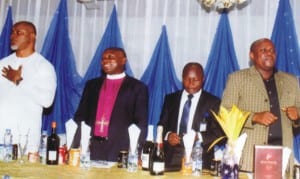Niger Delta
Expert Alerts On TB’s Prevalence In Edo

L-R: Commissioner for Commerce and Industry, Rivers State, Barr. Chuma Chinye, Bishop Emma Ogu, Perm. Sec. Policy and Strategy, Office of Head of Service, Rivers State, Sir Samuel Egbe, Chairman Editorial Board RSNC, High Chief Clinton Dagogo, during a send-forth party organised by Ministry of Commerce and Industry at Delta Hotel, Port Harcourt, last Monday. Photo: Egberi .A. Sampson
The Edo Tuberculosis (TB)
and Leprosy Control Officer, Dr Osagie Igbinigie, has expressed concern about the high rate of tuberculosis infections in the state.
He expressed the concern in an interview with newsmen in Benin.
He said that there were many cases of the infection in the state and noted that more than 2, 000 cases were registered in the state in 2014.
The control officer said that the figure might be higher because some cases were recorded in private hospitals.
“There are many cases of TB in the state, in 2014, we registered slightly above 2, 000 patients. “We know the cases are more than that because there are cases that are treated by private medical practitioners who do not use drugs supplied by the donor agencies’’, he said.
Igbinosa said that there were 197 centres in the state that offered free TB services to patients under the national TB control programme.
He, however, said that a major challenge affecting the success of the national programme on tuberculosis in the state was the fear of stigmatisation against sufferers.
The control officer said that stigmatisation had prevented sufferers from accessing treatment, and advised against it.
He said: “People are aware of the disease because we carry out campaigns at the state and local government levels.
“One of the challenges we have is fear of stigmatisation, the way people react to someone that has the disease. TB is like any other disease and it can affect anybody.
He said that other challenges affecting the programme in the state included poor accessibility to some rural areas, unfriendly behaviour of some health workers to TB patients and shortage of manpower.
Igbinigie advised patients suffering from the disease to adhere strictly to their medications, noting that improper medications often resulted in drug-resistance.
He said that the commonest symptom of the disease which was transmitted through the air was persistent cough that must have lasted for two or more weeks.
“When people inhale the TB bacteria into their body, they may or may not come down with the disease. “Some factors make it possible for a person to be infected such as weak immune system, amount of bacteria inhaled and length of exposure to the source of bacteria,” he said.
“According to the expert, “people who have diabetes and HIV that are not well managed can easily come down with TB”, adding that, “ there is no vaccine to prevent TB; the BCG that is given to children is to prevent the severe form of the disease occurring in children.
“Adults who took BCG when they were babies can still come down with TB”.
Niger Delta
Bishop Mocks Fake Prophecy Seekers … As Priests Relive Challenges At Ordination Ceremony
Niger Delta
Delta Leverages On Extensive River Networks To Drive Blue Economy
Niger Delta
C’River Hands Over Rubber Plantation to Private Company
-
Rivers2 hours ago
ASALGA Community Debunks Reports On Ownership Of Land Its Settlements
-
Opinion4 hours ago
Welcome! Worthy Future For R/S
-

 News20 mins ago
News20 mins agoNIMASA Shuts Two Lagos Terminals Over Security Breach
-
News3 hours ago
South-South Contributes N34trn To Nigeria’s Economy In 2024 – Institute
-

 Rivers2 hours ago
Rivers2 hours agoNDDC Inaugurates Ultra-Modern Market In Rivers Community
-
Rivers4 hours ago
Woji DPO: ‘A Police Officer With Impeccable Character’
-

 News16 mins ago
News16 mins agoShettima, Atiku, Obi Attend Buhari’s Fidau Prayer In Daura
-
News3 hours ago
NOA Set To Unveil National Values Charter — D-G

